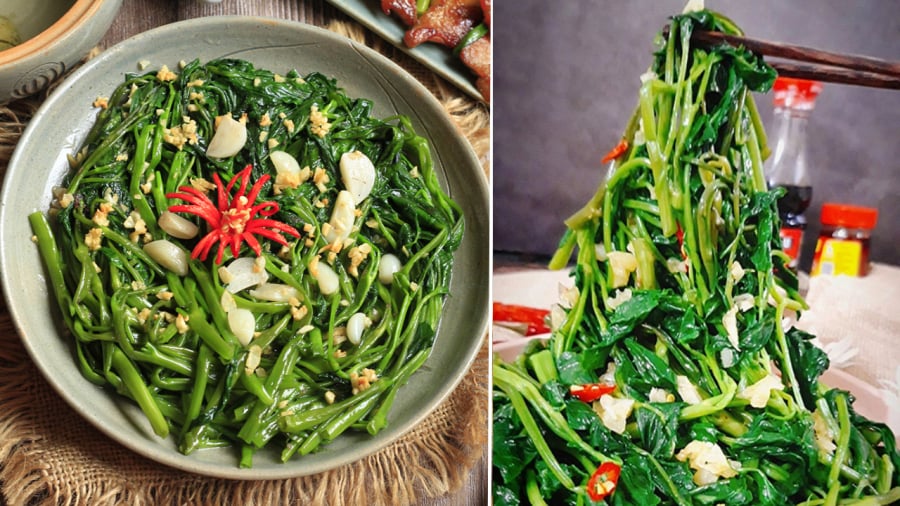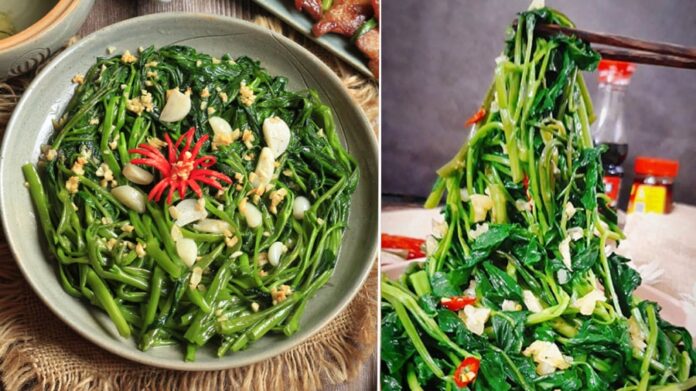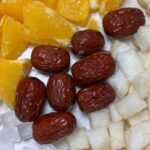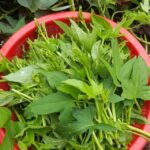Water Spinach’s Nutritional Value
Water Spinach’s Nutritional Value
Water spinach is a humble yet versatile vegetable that is a familiar sight in Vietnamese cuisine. It can be enjoyed raw, in salads, boiled, stir-fried, or even thrown into a hot pot, always delivering a delicious punch.
Nutritionally speaking, water spinach is packed with water, vitamin A, vitamin C, and iron. According to the Health & Life newspaper, the National Institute of Nutrition of Vietnam states that a 300-gram serving of water spinach can provide 79kcal of energy, 10 grams of protein, 3.1 grams of fiber, 6.6 grams of carbohydrates, 72mg of vitamin C, 17.463mg of beta-carotene, 312mg of calcium, 4.4mg of iron, 1.1mg of zinc, 1031.2mg of potassium, and 116.7mg of sodium.
The high fiber content in water spinach promotes healthy digestion, relieves constipation, and helps with various digestive disorders.
Additionally, the abundance of vitamins A, beta-carotene, and C act as antioxidants, neutralizing free radicals and preventing the oxidation of harmful cholesterol, thus benefiting cardiovascular health.
The generous amount of vitamin C in water spinach boosts the body’s immune system. Meanwhile, vitamins A, carotenoids, and lutein are essential for maintaining eye health.
Who Should Refrain from Eating Water Spinach?
- Individuals with Gout or Arthritis
Water spinach contains high levels of purines, which can increase uric acid levels in the blood. Since individuals suffering from gout or rheumatoid arthritis are advised to avoid purine-rich foods, consuming water spinach may exacerbate their condition and trigger painful flare-ups.
- Those with Open Wounds or Keloids
Water spinach contains compounds that stimulate collagen production, which can accelerate wound healing but also contribute to the formation of keloids in open wounds, especially in individuals prone to keloid scarring. It is recommended that individuals who have recently undergone surgery or have open wounds refrain from consuming water spinach for at least 2-3 weeks to allow wounds to heal and reduce the risk of keloid formation.

- Individuals with Kidney Stones
Water spinach is rich in oxalates, which can combine with calcium to form kidney stones. Therefore, it is not recommended for individuals with a history of kidney stones or urinary tract infections. In traditional medicine, water spinach is believed to have a cooling effect on the body. However, for individuals with infections, it may hinder the recovery process. Those taking anti-inflammatory medications should consult their doctors before consuming water spinach.
- People with Weak Digestive Systems
While water spinach is lauded for its high fiber content, which aids in digestion and prevents constipation, it may not be suitable for individuals with stomach ailments, diarrhea, or weak digestive systems. Consuming raw water spinach can aggravate these conditions, and the coarse fiber can irritate the gastric mucosa, leading to abdominal pain and bloating. It is advisable for these individuals to cook water spinach thoroughly before consumption.
- Individuals Taking Certain Medications
According to traditional medicine, water spinach may interact with certain medications for chronic illnesses, reducing their effectiveness or causing adverse effects. If you regularly take medication, it is advisable to consult your doctor before including water spinach in your diet.
In conclusion, while water spinach offers a plethora of health benefits, it may not be suitable for everyone. Those suffering from the aforementioned conditions should exercise caution and consult medical professionals before including water spinach in their diet.
The Ultimate Superfood: Discover the Vegetable That Grows with Ease and Packs a Powerful Vitamin C Punch
Water dropwort, or rau ngót, is an incredibly easy vegetable to grow, requiring only a simple branch-plugging technique to thrive. But beyond its accessibility as a household food, rau ngót is a bona fide “superfood,” boasting a vitamin C content that surpasses that of oranges and tangerines tenfold.
9 Immune-Boosting Foods That Fight the Flu
Introducing the 9 powerful immune-boosting foods that are easily accessible and affordable. These foods are the unsung heroes in your kitchen, ready to fortify your health and ward off ailments. Uncover the surprising yet familiar allies in your culinary arsenal, and embrace a stronger, healthier you.
The Ultimate Superfood: A Powerful Cancer-Fighting Vegetable Hiding in Plain Sight
“In Vietnam, there is a humble vegetable that is both easy to cultivate and delicious to consume. With a price tag of just a few thousand dong, this vegetable is a powerful ally in the fight against cancer. Unfortunately, many people are unaware of its incredible benefits. This unassuming hero is a true ‘superfood’ in disguise.”






































